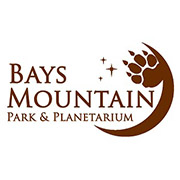Explore the Stars This Spring at Bays Mountain Park & Planetarium
Calling all dinosaur lovers and star enthusiasts! Bays Mountain Park & Planetarium has two new planetarium shows this spring that explore the planet’s reptiles of old and the stars in the sky above us. Plus, “SunWatch” and “StarWatch” are back to get you discovering the Sun and stars for yourself.
“Did an Asteroid Really Kill the Dinosaurs?” is the planetarium’s main feature for March through August. Did a space rock six miles wide really slam into the Earth 66 million years ago and wipe out 75 percent of all living species at that time, including the dinosaurs? Explore these impacts and cosmic collisions across the Solar System in this dynamic show produced by the Milwaukee Public Museum. The show includes footage from the first iridium layer found in Gubbio, Italy.
The alternate show for March and April is “Discover the Stars.” On a clear, dark night, most of us, at one time or another, have gazed upon the stars and wondered about all those tiny points of light. Many of us are able to identify different patterns and constellations in the stars. But, what are those tiny points of light? This exciting program takes viewers beyond a simple observation of the night sky and delves into the fascinating lives of stars. When we look up at the night sky, we can see that stars vary in brightness and have many different colors. The program reveals what is similar to all stars and what makes them unique. In “Discover the Stars,” we explore the many facets of a star’s life.
Beginning on March 7, “Discover the Stars” will play Saturdays and Sundays at 2 p.m. “Did an Asteroid Really Kill the Dinosaurs?” premiers March 14 and will play Tuesday through Friday at 4 p.m. and weekends at 1 p.m. and 4 p.m. Both shows last approximately 40 minutes and feature a tour of the current night sky.
For those that prefer a more hands-on experience, Bays Mountain Park’s free outdoor observing sessions return this spring. “SunWatch” and “StarWatch” are great opportunities to learn about stars both near to and far from our planet.
Witness the Sun in close detail at “SunWatch” every clear Saturday and Sunday from 3 to 3:30 p.m. at the dam, March through October. A member of the planetarium staff or the Bays Mountain Astronomy club will help guests look safely through a telescope at the Sun. Keep an eye out for dark patches—those may be Sunspots larger than the Earth!
On Saturday evenings in March and April, the Bays Mountain Astronomy Club hosts “StarWatch.” This free program gives guests the chance to observe the night sky in all its splendor from the top of the mountain. If the weather doesn’t cooperate, an alternate activity will be held in the planetarium theater. “StarWatch” dates for this spring are March 7 at 7 p.m.; March 14, 21 & 28 at 8 p.m.; and every Saturday in April as well as May 2 at 8:30 p.m.
All observing sessions are free, though Park entrance fees apply. Planetarium tickets are $5 per person. Children ages five and younger receive free admission with a paying adult, and Park Association members also receive free admission. For more information on Bays Mountain’s planetarium shows or group ticket costs, please visit baysmountain.com or call (423) 229-9447.





